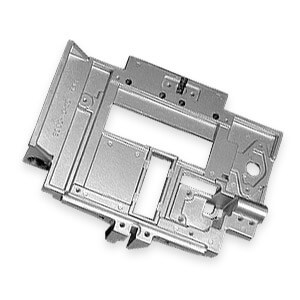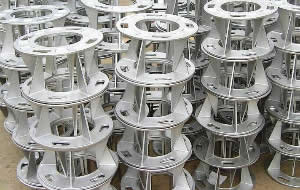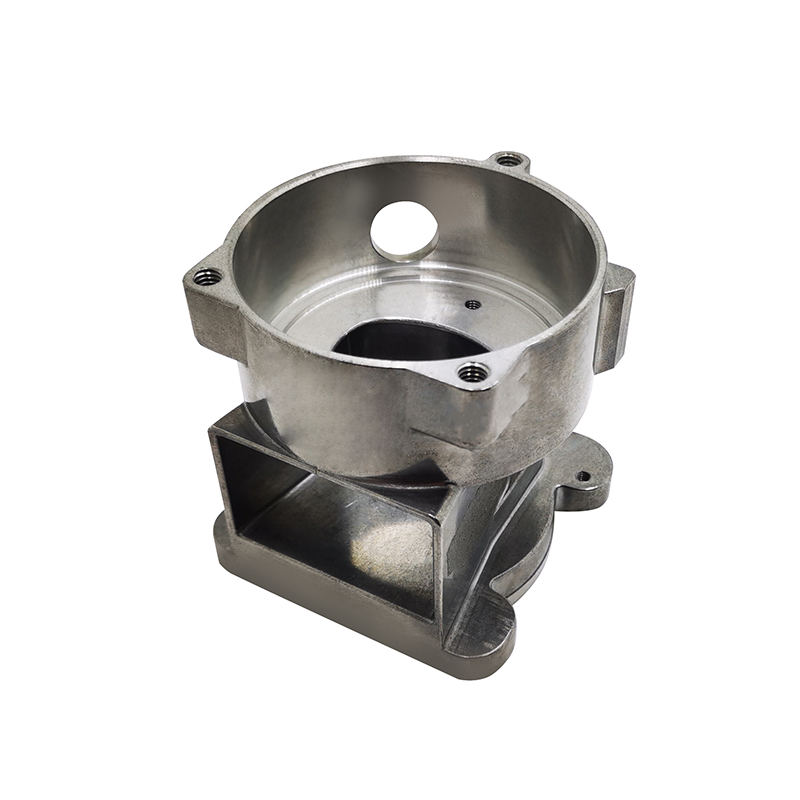Learn how aluminum casting delivers consistent manufacturing results
Just How Foundry Solutions Enhance Manufacturing Efficiency and Quality in Industrial Applications
Factory solutions play an important function in boosting production performance and quality across different commercial applications. By applying advanced steel spreading strategies, these services assure elements are produced with precision and consistency. This not just minimizes lead times yet additionally decreases waste, cultivating much better partnership in between foundries and manufacturers. The impact of top notch components on operational performance raises essential inquiries concerning the future of commercial manufacturing. What developments exist ahead in this advancing landscape?
The Function of Shop Services in Streamlining Production Processes

Furthermore, foundries usually provide know-how in alloy development, allowing manufacturers to make use of advanced products that boost item performance. The cooperation between producers and foundries cultivates a better understanding of production requirements, bring about enhanced procedures and boosted product styles. By leveraging factory solutions, suppliers can accomplish greater flexibility, adjust to changing market demands, and maintain competitiveness in the sector. Generally, the duty of factory solutions is vital in helping with a more cost-efficient and reliable production landscape.
Advanced Technologies in Shop Workflow
Ingenious technologies are changing shop procedures, considerably boosting performance and precision. Automation plays an essential role, with robotic systems streamlining recurring jobs such as molding and material handling. Furthermore, innovations in computer-aided style (CAD) and computer-aided production (WEBCAM) systems allow factories to produce intricate geometries with better accuracy and lowered product waste.
The assimilation of synthetic intelligence (AI) and equipment learning improves high quality control by monitoring procedures in real-time and anticipating prospective flaws before they occur. Using innovative materials, such as light-weight alloys and compounds, additionally enhances the performance qualities of actors products.
Furthermore, 3D printing innovation is revolutionizing prototyping and tooling, permitting rapid modification and decreased preparations. Collectively, these advanced technologies not just elevate manufacturing performance yet likewise assure that the end products fulfill strict top quality requirements, placing foundries at the center of modern industrial applications.
Lowering Lead Times With Efficient Factory Practices
Reliable factory methods play an important duty in minimizing lead times within production settings. By implementing streamlined production procedures and progressed scheduling techniques, producers can enhance operations and enhance resource appropriation. These enhancements not only increase result yet also add to total functional effectiveness.
Streamlined Manufacturing Procedures
Improving production processes is vital for minimizing lead times in the manufacturing sector. Effective shop practices, consisting of optimized process and resource monitoring, play a crucial role in accomplishing this goal. By minimizing waste and enhancing communication amongst groups, foundries can greatly enhance their functional effectiveness. The execution of standardized treatments additionally adds to constant top quality and faster turn-around times, making it possible for suppliers to react more swiftly to market demands. Additionally, the assimilation of advanced technologies, such as automation and real-time monitoring systems, helps in recognizing bottlenecks and assisting in prompt interventions. Overall, a concentrate on streamlined production processes not just speeds up lead times but likewise improves the general competition of commercial applications, making sure that products meet consumer assumptions efficiently.
Advanced Organizing Techniques
Reliable manufacturing procedures naturally lead suppliers to discover advanced organizing strategies as a way to better reduce preparations. By employing innovative algorithms and software application, foundries can maximize workflows, lining up production timetables with demand projections and source schedule. Strategies such as Just-In-Time (JIT) scheduling decrease inventory expenses while making sure timely product delivery, thus enhancing operational effectiveness. Furthermore, incorporating real-time information analytics enables shops to expect possible hold-ups and readjust routines proactively. This flexibility not just streamlines procedures but additionally improves general performance. Joint planning with clients and distributors can cultivate a much more synchronized supply chain, additional minimizing lead times. Ultimately, these sophisticated organizing strategies empower foundries to achieve greater efficiency and exceptional quality in their production procedures.
Making Certain Precision and High Quality in Steel Casting
Assuring precision and high quality in metal casting calls for a careful method that includes every stage of the production process. This process begins with careful layout and engineering of the molds, ensuring they can stand up to the liquified metal's temperature and stress. The option of high-grade basic materials is crucial, as pollutants can jeopardize the last product.
Once the products are prepared, exact temperature control throughout melting and pouring is basic to achieve the wanted residential properties in the cast metal. Keeping an eye on solidification and check it out cooling rates further assurances dimensional precision and surface area coating.
Quality control techniques, such as non-destructive testing and evaluation, are critical to determining problems early at the same time. aluminum casting. Additionally, employing skilled workers that understand the nuances of metal casting adds considerably to maintaining high criteria. Generally, these methods collectively enhance the dependability and efficiency of cast parts in various commercial applications
Lessening Waste and Maximizing Source Utilization

Furthermore, recycling scrap metal within the shop itself can significantly lower waste, transforming by-products right into useful resources. Lean producing principles also add to lose decrease by improving processes and eliminating unneeded actions, leading to more reliable procedures.
Routine upkeep of devices guarantees peak efficiency, preventing malfunctions that can result in lost products. By concentrating on these strategies, shops not only minimize prices however also add to sustainable practices, aligning with the expanding need for environmentally liable manufacturing approaches in commercial applications.
The Competitive Benefit of High-Quality Parts in the Market
High-grade elements offer a substantial competitive advantage in the foundry market, where accuracy and longevity are critical. Producers that focus on remarkable products and workmanship can boost item performance and reliability, leading to raised customer fulfillment. This advantage is particularly obvious in markets such as auto and aerospace, where element failure can have catastrophic repercussions.
Moreover, high-grade components commonly result in reduced upkeep prices and expanded product life-spans, which can be appealing selling factors for potential clients. As market needs grow for sustainable and reliable innovations, the focus on top quality comes to be a lot more essential. Business that invest in premium factory solutions not only enhance their production processes but additionally separate themselves from competitors that might give up high quality for expense savings. The dedication to high-grade parts ultimately converts into a stronger market setting and long-term service success.
Frequently Asked Concerns
What Kinds of Products Do Foundry Solutions Commonly Collaborate With?
Factory solutions typically function with steels such as aluminum, steel, iron, and brass, together with different alloys. They likewise handle products like composites and ceramics, dealing with varied industrial needs and specs in manufacturing procedures.
How Do Shop Solutions Impact Overall Supply Chain Management?
Foundry services greatly improve supply chain administration by streamlining product sourcing, minimizing preparations, and making certain constant top quality. Their ability to supply customized remedies promotes cooperation among stakeholders, eventually enhancing overall functional performance and responsiveness in production.
What Industries Advantage A Lot Of From Foundry Services?
Industries such as vehicle, customer, building and construction, and aerospace items substantially profit from foundry services. These markets rely upon accuracy castings to fulfill rigid top quality standards and boost their overall manufacturing procedures and product efficiency.
Are Shop Solutions Ecologically friendly and lasting?
Foundry solutions can be sustainable and environmentally friendly, particularly when using sophisticated modern technologies and processes - aluminum casting. Advancements such as recycling materials, lowering discharges, and enhancing power use add to lessening their ecological influence in industrial applications

Exactly How Can Business Choose the Right Shop Provider?
Firms can pick the ideal foundry provider by evaluating competence, manufacturing capacities, quality qualifications, technology used, customer reviews, and sustainability methods additional info while making sure have a peek here placement with their details task demands and long-lasting organization objectives.
Shop solutions play an essential duty in improving manufacturing efficiency and top quality throughout various commercial applications. The collaboration between manufacturers and foundries promotes a better understanding of manufacturing requirements, leading to enhanced procedures and enhanced item styles. Effective factory techniques play a crucial duty in decreasing lead times within production atmospheres. By utilizing innovative formulas and software application, factories can maximize process, straightening production schedules with demand projections and resource availability. Companies that invest in high-grade factory services not just boost their production processes however additionally distinguish themselves from competitors who may compromise high quality for cost financial savings.